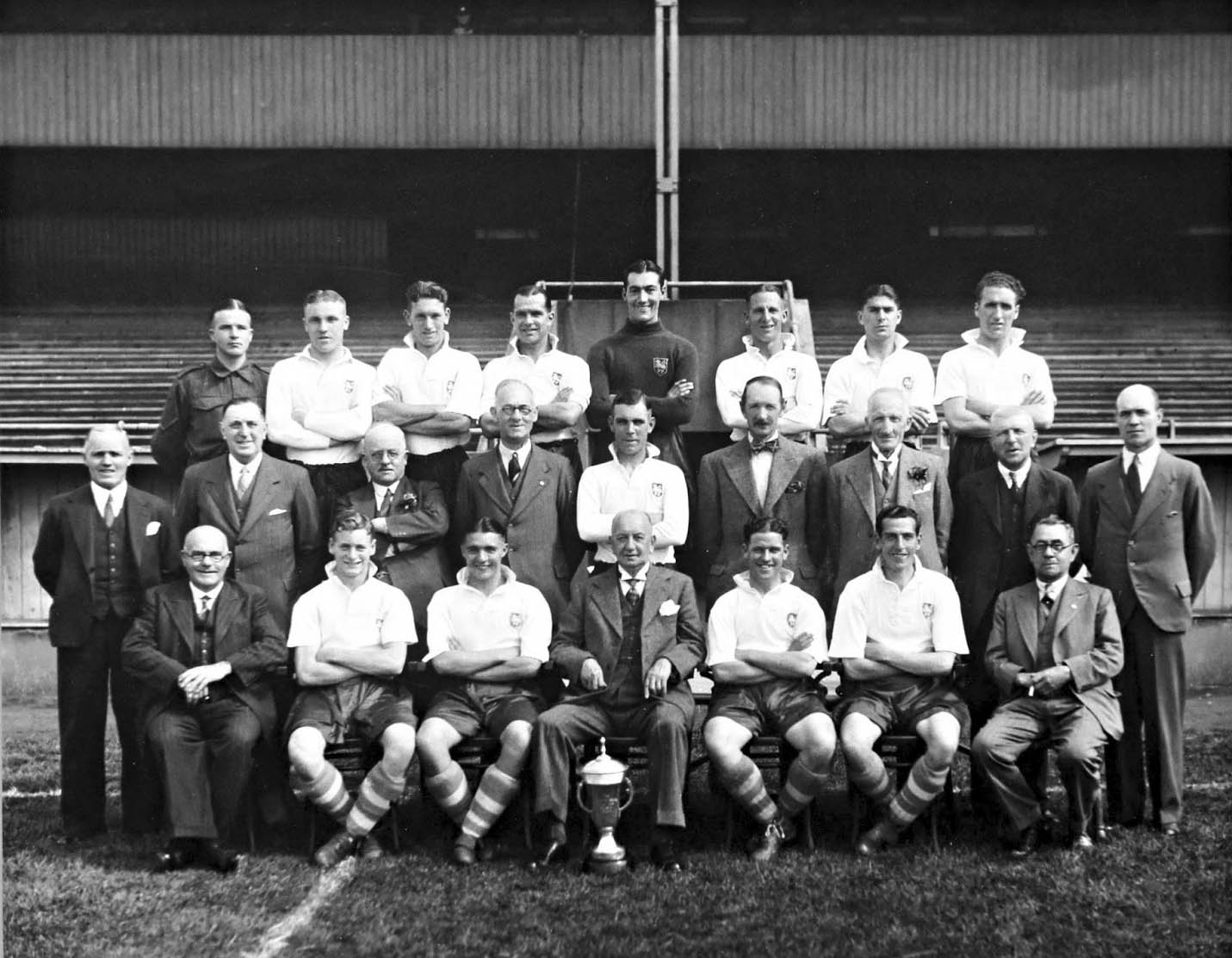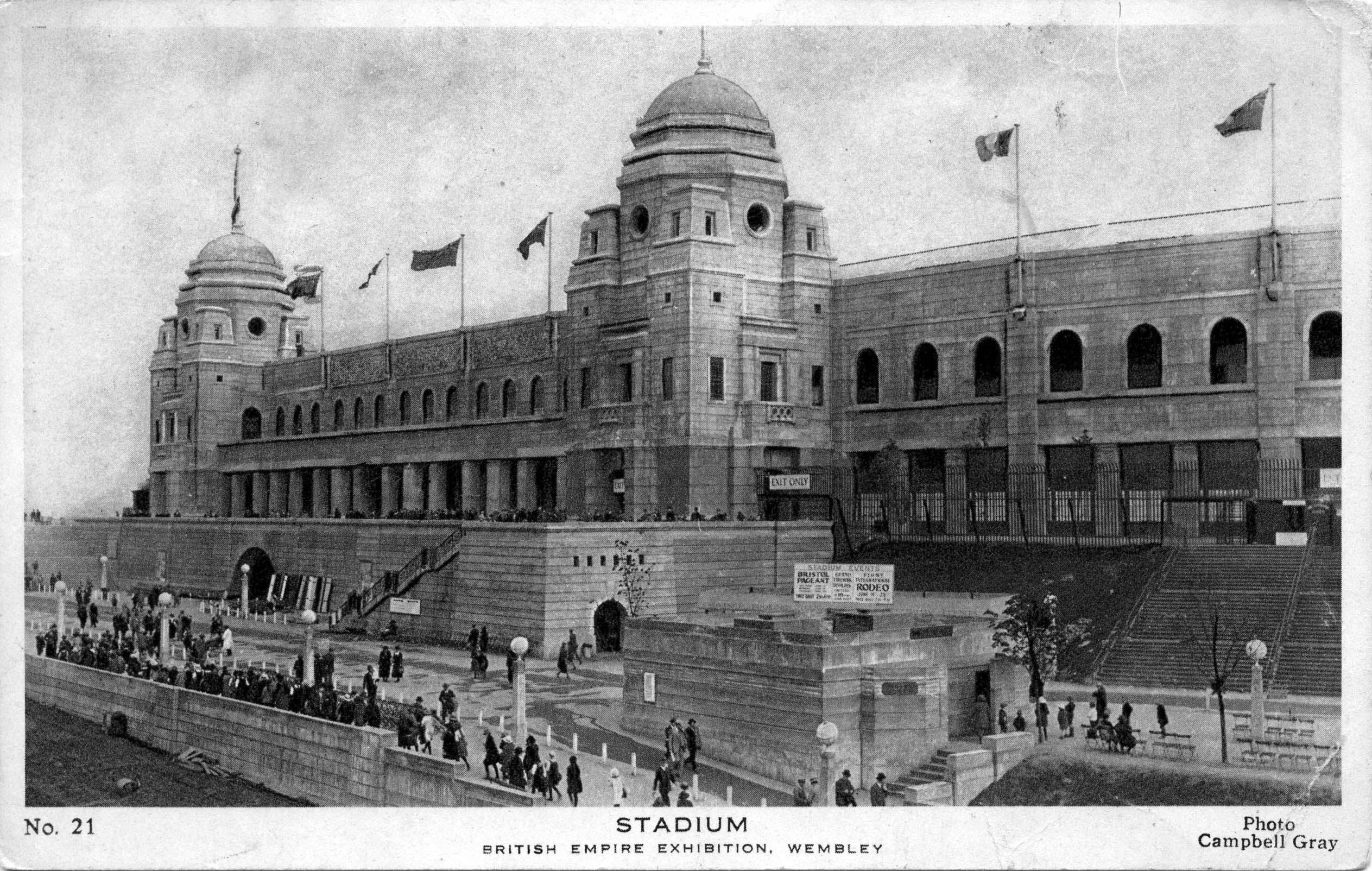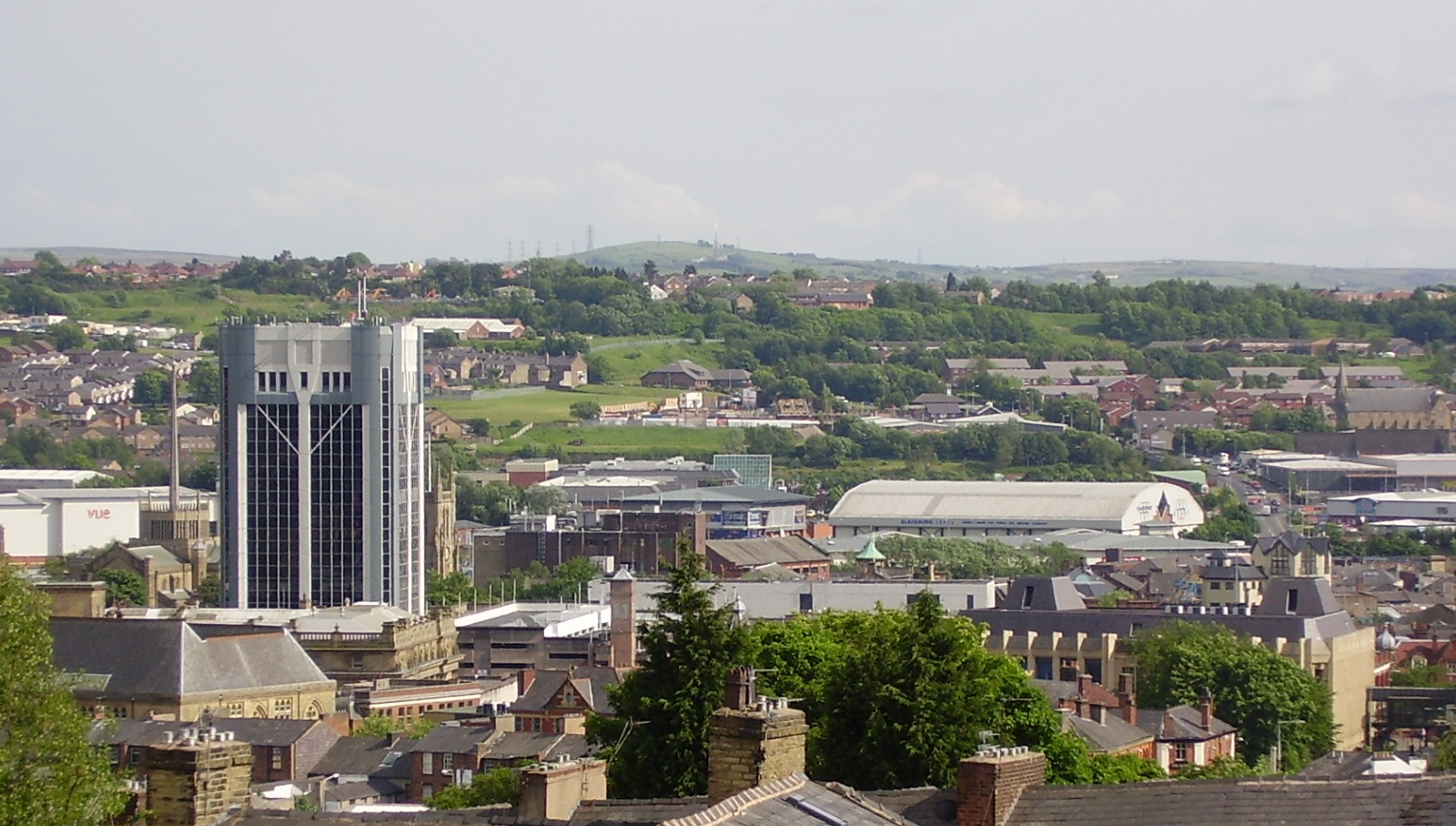|
1941 Football League War Cup Final
The 1941 Football League War Cup Final was contested by Arsenal and Preston North End. The first tie, played at Wembley Stadium on 4 May 1941, was drawn 1–1, McLaren scoring for Preston before Denis Compton equalised for Arsenal. The replay took place three weeks later, on 31 May 1941, at Ewood Park. Preston took the lead through Bobby Beattie Robert Beattie (24 January 1916 – 21 September 2002) was a Scottish footballer, who played for Kilwinning Rangers, Kilmarnock, Preston North End and Wigan Athletic. He made one appearance for Scotland in 1938. Beattie started his senior car ..., but Arsenal equalised late in the game courtesy of an own goal by Frank Gallimore. Within thirty seconds, Beattie had scored again for Preston, to secure the victory 2–1. __TOC__ Match details Final ---- Replay References League War Cup Final 1941 Football League War Cup War Cup Final 1941 War Cup Final 1941 Football League War Cup Final {{England-footy- ... [...More Info...] [...Related Items...] OR: [Wikipedia] [Google] [Baidu] |
Football League War Cup
The Football League War Cup was an association football tournament held between 1939 and 1945. It aimed to fill the gap left in English football by the suspension of the FA Cup during the Second World War. Though it was often referred to in contemporary coverage as the "League Cup" or "Football League Cup", it is not to be confused with the later English football competition with the same name, which was formed in 1960 and is currently known as the EFL Cup. As with all wartime football in England, records and statistics from the competition are not considered official. Overview The Football League (War) Cup was formed in 1940 to be a replacement for the FA Cup, which had been suspended for the duration of the conflict. Ties were played over two legs in order to boost revenue for clubs. In the 1941–42 season, 16 clubs from London and South East England did not participate owing to a dispute with the Football League over the formation of a separate London League. Instead they ... [...More Info...] [...Related Items...] OR: [Wikipedia] [Google] [Baidu] |
Preston North End F
Preston is a place name, surname and given name that may refer to: Places England *Preston, Lancashire, an urban settlement **The City of Preston, Lancashire, a borough and non-metropolitan district which contains the settlement **County Borough of Preston, a local government district containing the settlement from 1835 to 1974 **Preston (UK Parliament constituency) **Preston railway station in Preston, Lancashire **The PR postcode area, also known as the Preston postcode area **Preston Urban Area, the conurbation with Preston at its core *Preston, Devon (in Paignton) *Preston, Teignbridge, in Kingsteignton parish *Preston, Dorset *Preston, East Riding of Yorkshire, near Kingston upon Hull *Preston, Cotswold, Gloucestershire *Preston, Forest of Dean, Gloucestershire *Preston, Hertfordshire *Preston, London, near Wembley **Preston (ward) *Preston, Northumberland, the location of Preston Tower, Northumberland, Preston Tower *Preston, Rutland *Preston, Shropshire, in Upton Magna ... [...More Info...] [...Related Items...] OR: [Wikipedia] [Google] [Baidu] |
Arsenal F
An arsenal is a place where weapon, arms and ammunition are made, maintenance, repair, and operations, maintained and repaired, stored, or issued, in any combination, whether Private property, privately or state-owned, publicly owned. Arsenal and armoury (British English) or armory (American English) are mostly regarded as synonyms, although subtle differences in usage exist. A sub-armory is a place of temporary storage or carrying of weapons and ammunition, such as any temporary post or patrol vehicle that is only operational in certain times of the day. Etymology The term in English entered the language in the 16th century as a loanword from french: arsenal, itself deriving from the it, arsenale, which in turn is thought to be a corruption of ar, دار الصناعة, , meaning "manufacturing shop". Types A lower-class arsenal, which can furnish the materiel and equipment of a small army, may contain a laboratory, gun and carriage factories, small-arms ammunition, sm ... [...More Info...] [...Related Items...] OR: [Wikipedia] [Google] [Baidu] |
Wembley Stadium (1923)
The original Wembley Stadium (; originally known as the Empire Stadium) was a stadium in Wembley, London, best known for hosting important football matches. It stood on the same site now occupied by its successor. Wembley hosted the FA Cup final annually, the first in 1923, which was the stadium's inaugural event, the League Cup final annually, five European Cup finals, the 1966 World Cup Final, and the final of Euro 1996. Brazilian footballer Pelé once said of the stadium: "Wembley is the cathedral of football. It is the capital of football and it is the heart of football", in recognition of its status as the world's best-known football stadium. The stadium also hosted many other sports events, including the 1948 Summer Olympics, rugby league's Challenge Cup final, and the 1992 and 1995 Rugby League World Cup Finals. It was also the venue for numerous music events, including the 1985 Live Aid charity concert. In what was the first major WWF (now WWE) pay-per-view ... [...More Info...] [...Related Items...] OR: [Wikipedia] [Google] [Baidu] |
London
London is the capital and largest city of England and the United Kingdom, with a population of just under 9 million. It stands on the River Thames in south-east England at the head of a estuary down to the North Sea, and has been a major settlement for two millennia. The City of London, its ancient core and financial centre, was founded by the Romans as '' Londinium'' and retains its medieval boundaries.See also: Independent city § National capitals The City of Westminster, to the west of the City of London, has for centuries hosted the national government and parliament. Since the 19th century, the name "London" has also referred to the metropolis around this core, historically split between the counties of Middlesex, Essex, Surrey, Kent, and Hertfordshire, which largely comprises Greater London, governed by the Greater London Authority.The Greater London Authority consists of the Mayor of London and the London Assembly. The London Mayor is distinguished fr ... [...More Info...] [...Related Items...] OR: [Wikipedia] [Google] [Baidu] |
Ewood Park
Ewood Park () is a football stadium in Blackburn, Lancashire, England, and the home of Blackburn Rovers F.C., founding members of the Football League and Premier League, who have played there since 1890. It is an all seater multi-sports facility with a capacity of 31,367, and four sections: the Bryan Douglas Darwen End, Riverside Stand, Ronnie Clayton Blackburn End, and Jack Walker Stand, named after Blackburn industrialist and club supporter, Jack Walker. The football pitch within the stadium measures The "old" Ewood Football had been played on the site since at least 1881; Rovers played four matches there when it was known as Ewood Bridge and was most likely little more than a field. Their first match was against Sheffield Wednesday on 9 April 1881. Ewood Park was officially opened in April 1882 and during the 1880s staged football, athletics and some form of greyhound racing (not oval). Rovers moved back in during 1890, signing a ten-year lease at an initial annual rent ... [...More Info...] [...Related Items...] OR: [Wikipedia] [Google] [Baidu] |
Blackburn
Blackburn () is an industrial town and the administrative centre of the Blackburn with Darwen borough in Lancashire, England. The town is north of the West Pennine Moors on the southern edge of the Ribble Valley, east of Preston and north-northwest of Manchester. Blackburn is the core centre of the wider unitary authority area along with the town of Darwen. It is one of the largest districts in Lancashire, with commuter links to neighbouring cities of Manchester, Salford, Preston, Lancaster, Liverpool, Bradford and Leeds. At the 2011 census, Blackburn had a population of 117,963, whilst the wider borough of Blackburn with Darwen had a population of 150,030. Blackburn had a population of 117,963 in 2011, with 30.8% being people of ethnic backgrounds other than white British. A former mill town, textiles have been produced in Blackburn since the middle of the 13th century, when wool was woven in people's houses in the domestic system. Flemish weavers who settled in t ... [...More Info...] [...Related Items...] OR: [Wikipedia] [Google] [Baidu] |
Denis Compton
Denis Charles Scott Compton (23 May 1918 – 23 April 1997) was an English multi-sportsman. As a cricketer he played in 78 Test matches and spent his whole cricket career with Middlesex. As a footballer, he played as a winger and spent most of his career at Arsenal. A right-handed batsman and left-arm unorthodox spin bowler, Compton is regularly credited as one of England's most remarkable batsmen. Indeed, Sir Don Bradman said he was one of the greatest cricket players he'd ever seen. He is one of only twenty-five players to have scored over one hundred centuries in first-class cricket. In 2009, Compton was posthumously inducted into the ICC Cricket Hall of Fame. The Denis Compton Oval and a stand at Lord's Cricket Ground are both named in his honour. Cricket career Early years Compton was born and brought up in what was then the urban district of Hendon, which later became part of Greater London; his father had moved there in hopes of finding more work. He was the second s ... [...More Info...] [...Related Items...] OR: [Wikipedia] [Google] [Baidu] |
Bobby Beattie
Robert Beattie (24 January 1916 – 21 September 2002) was a Scottish footballer, who played for Kilwinning Rangers, Kilmarnock, Preston North End and Wigan Athletic. He made one appearance for Scotland in 1938. Beattie started his senior career with Kilmarnock and scored 43 goals in 120 Scottish Football League appearances for the club. He was sold to Preston North End in October 1937 for £2,500. He joined a club which already had several Scottish players, including Andy Beattie and Bill Shankly. During his first season with the club, Beattie was part of the team that won the 1938 FA Cup Final The 1938 FA Cup Final was contested by Preston North End and Huddersfield Town at Wembley Stadium. Preston, losing finalists the previous year, won by a single goal. This was their second win in the competition. Background After 29 minutes of e .... Competitive football stopped due to the Second World War, but Beattie continued to play for Preston when the Football League resume ... [...More Info...] [...Related Items...] OR: [Wikipedia] [Google] [Baidu] |
Preston North End Team 1941
Preston is a place name, surname and given name that may refer to: Places England * Preston, Lancashire, an urban settlement **The City of Preston, Lancashire, a borough and non-metropolitan district which contains the settlement ** County Borough of Preston, a local government district containing the settlement from 1835 to 1974 **Preston (UK Parliament constituency) ** Preston railway station in Preston, Lancashire **The PR postcode area, also known as the Preston postcode area **Preston Urban Area, the conurbation with Preston at its core * Preston, Devon (in Paignton) * Preston, Teignbridge, in Kingsteignton parish * Preston, Dorset * Preston, East Riding of Yorkshire, near Kingston upon Hull * Preston, Cotswold, Gloucestershire *Preston, Forest of Dean, Gloucestershire *Preston, Hertfordshire *Preston, London, near Wembley **Preston (ward) * Preston, Northumberland, the location of Preston Tower * Preston, Rutland * Preston, Shropshire, in Upton Magna parish * Prest ... [...More Info...] [...Related Items...] OR: [Wikipedia] [Google] [Baidu] |
1940–41 In English Football
The 1940–41 season was the second season of special wartime football in England during the Second World War. Honours League competition was split into two regional leagues, one North and one South. Teams played as many fixtures as was feasible, and winners were decided on goal average rather than points. See also *England national football team results (unofficial matches) This is a list of the England national football team's results from 1870 to the present day that, for various reasons, are ''not'' accorded the status of official International A Matches. 1870s 1890s The Football Association (FA) instiga ... References {{DEFAULTSORT:1940-41 In English Football Wartime seasons in English football ... [...More Info...] [...Related Items...] OR: [Wikipedia] [Google] [Baidu] |





